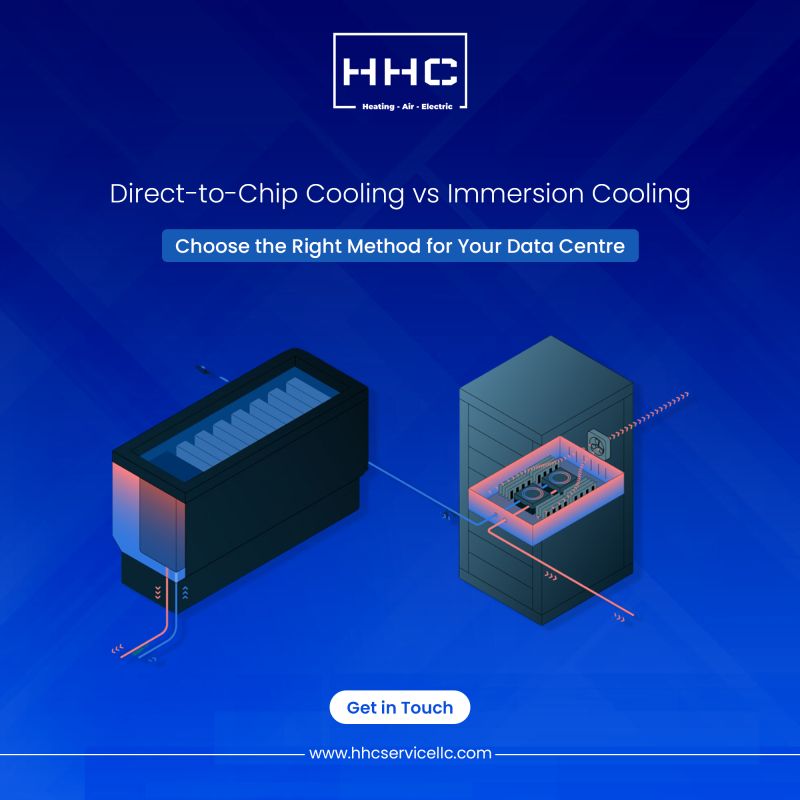HHC Services LLC Highlights Advantages of Direct-to-Chip Cooling Fluid Over Traditional Methods
RIVERVIEW, FL / ACCESS Newswire / February 5, 2025 /With the increasing demands of data centers, the pursuit of effective cooling solutions has escalated. HHC Services LLC, a prominent provider of commercial and industrial HVAC services, elucidates the increasing implementation of direct-to-chip liquid cooling and its benefits relative to conventional air-cooling techniques. This transition tackles the escalating thermal density of contemporary processors and the constraints of traditional cooling mechanisms.

Conventional air cooling, although efficient for several applications, is inadequate for dissipating the concentrated heat produced by high-performance computers. This may result in performance degradation, diminished device longevity, and heightened energy usage. Conversely, direct-to-chip cooling fluid provides a more focused methodology. This process entails direct contact between a cooling fluid, usually a dielectric liquid, and the heat-producing components, including CPUs and GPUs. This direct contact facilitates markedly more efficient heat transmission, permitting elevated clock rates and enhanced computing power.
This technique utilizes cold plates or customized fittings affixed to the chips. These cold plates direct the cooling fluid, absorbing heat at the source. The heated fluid subsequently flows through a closed-loop system, transferring heat to a secondary cooling medium. This system frequently incorporates a Coolant Distribution Unit (CDU), which regulates the flow and temperature of the coolant. CDUs are available in multiple varieties, each tailored to address certain cooling needs. Some CDUs incorporate heat exchangers to transfer heat to an external water loop, while others utilize chillers for a more robust cooling capacity. The selection of a CDU is contingent upon variables such as heat load, existing infrastructure, and required temperature levels.
A burgeoning liquid cooling method is immersion cooling. This method immerses complete servers or components in a dielectric fluid. Although immersion cooling provides superior heat dissipation, direct-to-chip cooling gives benefits for maintainability and localized cooling. Direct-to-chip systems facilitate seamless integration into current infrastructure and enable individual component maintenance without interrupting the entire system.
The benefits of direct-to-chip cooling extend beyond performance. Facilitating higher-density computing can diminish the physical footprint of data centers, hence reducing real estate expenses. Moreover, the enhanced efficiency of liquid cooling can substantially cut energy usage, resulting in diminished running costs and a lesser environmental footprint. This is especially pertinent in the current environmentally aware context, where data centers face mounting pressure to reduce their carbon footprint.
The organization comprehends the complexities of deploying sophisticated cooling systems such as direct-to-chip and immersion cooling. In addition to liquid cooling, the organization offers proficiency in conventional HVAC systems, encompassing chillers, boilers, aquatherm pipeinstallations, air handlers, and rooftop package units. They collaborate with prominent manufacturers, including Trane and Carrier, providing a variety of solutions for commercial and industrial HVAC applications. This extensive knowledge enables them to counsel clients on the most suitable cooling plan for their particular requirements, whether it entails conventional air conditioning, advanced liquid cooling, or a hybrid method.
The implementation of direct-to-chip cooling extends beyond high-performance computing. With the rising demands for AI cooling, this technology is being utilized across multiple sectors, including finance, research, manufacturing, and telecommunications. Efficient and effective cooling of components is essential for maximizing the potential of AI and other computationally demanding tasks. Wireless monitoring systems, like Pelican wireless solutions, are frequently incorporated into these systems, facilitating real-time performance assessment and preventative maintenance.
The company underscores the need of meticulous planning and design in the execution of direct-to-chip cooling. Considerations must include fluid selection, cold plate design, CDU capacity, and interaction with existing infrastructure. A comprehensive comprehension of these aspects is crucial for guaranteeing the enduring reliability and efficacy of the cooling system. The organization is dedicated to providing expertise and support in the advancing field of data center cooling technology.
For any press-related queries or additional details, please visit https://hhcservicellc.com.
About HHC Services LLC
Established in 2010, HHC Services LLC is a premier provider of commercial HVAC, electrical, and industrial HVAC solutions, catering to organizations in Arizona, California, Florida, and Nevada. The company specializes in advanced cooling technologies, including Direct-to-Chip Liquid Cooling, immersion cooling, and sophisticated CDU systems, to enhance thermal management for data centers and commercial environments. The company specializes in boilers, chillers, air handlers, and rooftop package units, providing creative, energy-efficient solutions customized for contemporary corporate requirements.
Contact Information
Organization/Business Name: HHC Services LLC
City: Riverview
State / Province: Florida
Country: USA
Postal Code/Zip Code: 33578
Contact Person Full Name: Korey Howell
Email Address: info@howellh.com
SOURCE:HHC Services LLC
View the original press release on ACCESS Newswire
© 2025 ACCESS Newswire. All Rights Reserved.



















